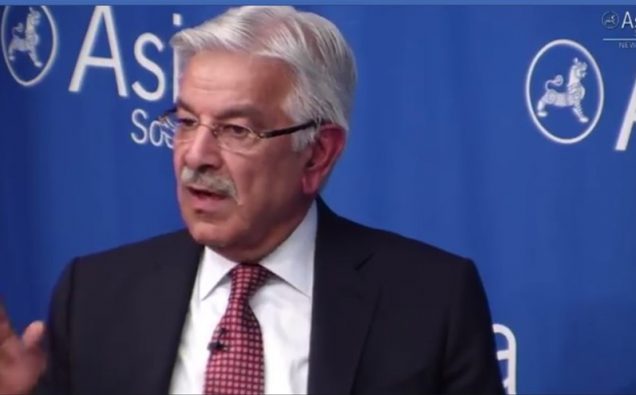
While renewing its commitment to combat terrorism, Pakistan has said it would work with the United States for the goal of Afghan stability but emphasized that its landlocked western neighbor needs political settlement.
“We are mindful of the strong desire in the U.S. to bring the ‘long war’ in Afghanistan to an end,” Foreign Minister Khawaja Asif said in New York days after an ice-breaking meeting between US Vice President Mike Pence and Prime Minister Shahid Khaqan Abbasi.
The meeting between Pence and Abbasi took place after some tough diplomacy from both sides on the way forward in Afghanistan following President Donald Trump’s announcement of a new Afghan policy, which, Islamabad says ignores Pakistan’s security concerns.
The two sides have openly voiced differences on some of the issues concerning Afghanistan. But during his speech to a New York think tank Asif also expressed gratitude for his country.
Islamabad, he said, backs the U.S. desire for peace and stability in Afghanistan, where it has been leading the fight against terrorist groups since 9/11 terror attacks.
“We support this objective wholeheartedly and are ready to help in any way we could to achieve peace and stability in Afghanistan,” he said at Asia Society.
At the same time, the foreign minister reminded the audience there were limits to what Pakistan could do on its own.
“We cannot take responsibility for Afghanistan’s peace and security and be asked to achieve what the combined strength of some of the most powerful and richest countries could not accomplish,” he said.
He also addressed the thorny issue of curbing cross-border militancy along Pakistan-Afghanistan border.
“Effective border management frankly is the key,” the minister said. “More needs to be done on the Afghan side of the border where terrorist elements are finding easy safe havens.”
Asif opposed too much reliance on military effort as a means to achieve peace in Afghanistan.
“We are keen to work with the US in effectively managing the Afghan border and in facilitating a peace process to the extent we can,” he remarked.
“The emergence of new threats including (Da’esh) demands ever greater coordination and stronger partnerships between like-minded countries to put up a united front to counter these dark forces of exclusion and extremism.”
The foreign minister rejected the allegation that Pakistan was behind the Afghan troubles.
“Scapegoating Pakistan for all the Afghan ills is neither fair nor accurate,” Asif, said.”This will only help forces that we are trying to fight collectively,” he added.
Pakistan, he said, stands for greater regional integration and connectivity. “The most promising element of this policy is the recently launched China-Pakistan Economic Corridor (CPEC), a multi-billion dollars initiative entailing multiple development and connectivity initiatives and projects, including infrastructure, energy, Gwadar port and industrial cooperation.
Other regional economic projects include TAPI, CASA-1000 and improved trading partnership between Pakistan, Afghanistan and Tajikistan.
“Within this scheme of things,” Asiif said, “the US remains our critical partner and there are strong and enduring bases for this partnership to continue in the future.”
Both Pakistan and the US have strong convergences in fighting terrorism and working together to stop the spread of violent extremism espoused by the ISIL. Similarly, peace and stability in Afghanistan is in our mutual interest, and the benefits accruing from a stable and secure region benefit the US as much as it benefits us.
“In our view, Pakistan and the US have always benefited when they work together.
“We are grateful for the US support to Pakistan in a broad range of areas. For many years, the US has been supportive of building Pakistan’s capacity and helping us overcome our challenges. The US has helped us deal with our electricity shortages and the USAID is supporting one of the largest Fulbright Scholarship Program for Pakistan-especially for women.
“The US assistance in building infrastructure in remote areas such as FATA will leave an enduring impact in stimulating economic development in an area that had been infested with extremist ideologies for decades.”
“A close and enduring partnership between Pakistan and the US is, we believe, a strategic imperative for achieving lasting peace and stability in the region and beyond. This is what we are working to secure with our friends and partners in the US. “















